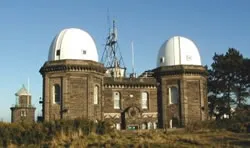
Today, the British Oceanographic Data Centre (BODC) celebrates its 50th anniversary with an international meeting looking at the “Past, present and future: successes and challenges in managing marine data”.
Over 100 colleagues and collaborators from across the UK, Europe and the USA are joining BODC for a day of talks and discussions, including a panel discussion to forecast future developments in managing marine data.
Part of the National Oceanography Centre (NOC), BODC delivers world class marine science services and facilities to the whole UK marine science community for the benefit of society and the global scientific endeavour.
Dr Graham Allen, Head of BODC, said “Now is an exciting time for providing marine data management services. These are needed now more than ever due to the increased demand for access to quality marine data to support society – rising from the challenge of understanding the ocean. Today new technologies enable more extensive, autonomous ocean observations; big data and other enabling technologies provide new opportunities. We are looking forward to the challenges of the UN Decade of Ocean Science for Sustainable Development – and to the next 50 years!”
Presently, BODC leads and collaborates in some of the largest and most ambitious marine data projects nationally and internationally. These include the Nippon Foundation GEBCO Seabed2030 Project, providing the global data centre for GEOTRACES and UK Argo data centre, continued participation in the EU SeaDataNet projects and improving data delivery – both near-real-time and delayed-mode. BODC is one of the first National Oceanographic Data Centre’s to become accredited by the Intergovernmental Oceanographic Commission of UNESCO (IOC-UNESCO) International Data and Information Exchange programme.
The 50th Anniversary meeting celebrated these successes as well as other key innovative developments and changes in data collection and management. A YouTube Playlist of presentations will be available here in the coming weeks and will feature a welcome by Ed Hill, NOC Executive Director.
History of the BODC
Born in 1969, the British Oceanographic Data Service (BODS) was established by the Natural Environment Research Council at the National Institute of Oceanography in Wormley, Surrey, to act as the UK’s NODC, and participate in the international exchange of data as part of the IOC-UNESCO network of national data centres.
In 1975 BODS transferred to Bidston Observatory, near Liverpool, as part of the newly formed Institute of Oceanographic Sciences. In 1976 BODS became the data banking section of the Marine Information and Advisory Service with a primary activity of managing the data collected from the UK Offshore Operators Association network of weather ships, oil rigs and large-scale data buoys. Subsequently archives of wave, moored current meter, offshore tide gauge and CTD data were assembled. In April 1989 MDBS was restructured to form the British Oceanographic Data Centre (BODC), with the mission to 'operate as a world-class data centre in support of UK marine science', continuing and expanding on its original remit.
BODC’s key achievements
- Initial database design and implementation of a system suitable for multiple types of marine data
- Design and implementation of the IOC General Format Version 3 (GF-3) system and software for exchange of oceanographic data
- Design of the IOC Cruise Summary Report (CSR) and development of the UK research cruise inventory
- Pioneered end-to-end data management, including project data set delivery on CD-ROM with software (starting with the NERC North Sea Project)
- European Directory of Marine Environmental Data (EDMED), initiated by BODC in 1991 within the EU Marine Science and Technology (MAST) framework, is an inventory of marine data and data holding centres; it continues to be part of the SeaDataNet infrastructure
- International centre (on behalf of IOC and the International Hydrographic Organization) for creating, maintaining and publishing the General Bathymetric Chart of the Oceans (GEBCO) Digital Atlas, and later gridded data sets; now taking a lead in the GEBCO Seabed2030 project
- NERC Vocabulary Server (NVS2.0), providing access to lists of standardised terms that cover a broad spectrum of disciplines of relevance to the oceanographic and wider community
- Data management system for UK Argo floats
- Setting the standard for using persistent identifiers (e.g. Digital Object Identifiers (DOIs)) with data sets and establishment of the Published Data Library for data sets with DOIs
- New method of data and metadata access through Linked Data implementations
- Contribution to EMODnet by making over 125,000 datasets available through the SeaDataNet infrastructure
- Development of near real-time data management infrastructure (for gliders and other autonomous vehicles, sensorML etc.)
